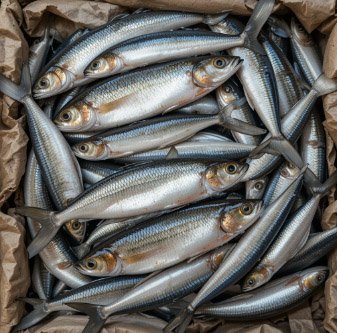Why should I eat Sardines?
Sardines (Pilchards) are a small, oily, and very nutritious fish. Many people find their taste unappealing. This is because sardines have a strong, fishy taste as they contain a chemical called trimethylamine (TMA). They also have an oily texture, which some people do not like. Canned sardines often have small bones that some people find unpleasant to eat.

However, sardines and other small fish like anchovies and herrings are considered a true superfoods, packed with essential nutrients that support overall health.
They are one of the richest natural sources of omega-3 fatty acids, which are crucial for heart and brain health. Omega-3s help lower inflammation, improve cholesterol levels, and may even boost mood.
Sardines are also incredibly high in vitamin D, a nutrient that many people lack but is essential for strong bones and a healthy immune system.
Additionally, sardines provide a good amount of calcium, since their edible bones are soft and safe to eat.
They are also rich in protein, making them an excellent choice for maintaining muscle mass and staying full longer.
Because sardines are small fish, they contain much lower levels of mercury and other contaminants compared to larger fish like tuna or swordfish. This makes them a much safer choice, especially for children and pregnant women.
Eating sardines, herring, and anchovies is also a more environmentally friendly option. These fish are at the bottom of the food chain and reproduce quickly, allowing them a much more sustainable choice than larger fish like tuna or salmon.
Adding them to your diet is not only a smart and powerful step but also helps protect ocean ecosystems, reduce overfishing of large predator fish, and save the world’s fish stocks.
Serving tips:
Although their strong taste might take some getting used to, these small fish can be enjoyed in many ways—grilled, mixed into salads, or on whole-grain crackers with lemon and herbs.
Read further on:
≺≺ Does my social circle impact my weight?
≺≺ What happens to my blood vessels when I gain weight?
≺≺ What are the four enemies of blood sugar?
≺≺ List of recommended fats and oils.
≺≺ Harmful effects of high cholesterol.
≺≺ List of recommended fats and oils.
≻≻ Watch this page for more such informative articles on Health, Nutrition, and Wellness.
≻≻-Back to Home page.
Further reading (External Links opens in new window):
≺≺- The Monterey Bay Aquarium - Seafood watch.